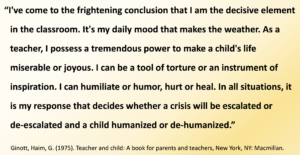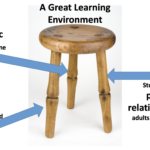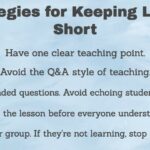When Students Are Disruptive: 10 Ideas to Try

One student can change the feel of a whole classroom. John throws a tantrum whenever things don’t go his way. Alicia enters the room each morning with a deep scowl exuding negative energy. Allen has way too much sexual knowledge and seems to say something inappropriate whenever you’re out of earshot, offending and upsetting other students.
It’s hard not to be resentful of these students. We secretly may wish they would move—our lives would be so much easier without them. And yet, these are the students who need us the most. These are the kids who may not have any other stable adults in their lives. They need us. But then again, so do all of our other students, many of whom have plenty of other less dramatic–but still important–challenges. How can we support these students who struggle, take care of the rest of our class, and maintain some semblance of sanity ourselves? There aren’t any silver bullet cures, but the following strategies might serve as helpful starting points.
[tweet_box design=”default” float=”none”]The students who are most disruptive are the very students who need us the most![/tweet_box]
Be gentle with yourself. There’s no doubt that students with severe challenges can wear us down. Whenever possible, try and reduce your feelings of guilt and failure. Say to yourself, “Tom is having a tough time right now,” instead of, “Tom is ruining my lesson! I feel like a failure!” At the end of each day, jot down a few things that went well so that you are reminding yourself of the good stuff too!
Take care of the rest of the class. One student can’t be allowed to make it so twenty-five other students can’t learn. Also, when a student becomes out of control in class, it can be scary for everyone else, making school feel less safe. We may not be able to “fix” a student’s behavior, but we can help protect the rest of the class. Have a place for this student to go when they’re melting down. Your students deserve to have your best teaching.
Connect personally. What are Marie’s interests outside of school? Is she into basketball? Is she interested in music, and if so, what are her favorite groups? Is she into video games? I once listened to a whole lot of boy-band music I didn’t love so I could talk about it with a challenging student. It afforded us some nice moments between our daily struggles.
Focus on baby steps. Try (as much as possible) to focus on Luke’s successes, no matter how small. A “good” reading period might be one where he only gets up twice, even if your expectation is that everyone sits for the whole reading period. Make sure to recognize this “leading edge behavior”: “Hey Alex! I noticed that you only got up twice today during reading. That’s your best so far this week!”
Find some special opportunities and privileges. All too often, kids who struggle get hammered more and more for the challenges they face, never getting any kinds of special treats or chances to do something different. Consider setting Brian up as a tutor for a needy younger child where he gets to work with that child every day for 20 minutes (or two or three times a week). Not only will it boost Brian’s sense of self-worth (to be needed is a very powerful thing), but it will also give you a 20-minute respite each day…not a bad bonus.
Don’t rely on consequences or rewards. Although consequences might be necessary to stop misbehaviors before they escalate, they aren’t good long-term solutions. Similarly, rewards and incentives assume that kids are choosing to be out of control and just need to be motivated. Remember, as Ross Greene says, kids do well if they can, so we need to find out what’s getting in their way and then help them learn new strategies for self-control.
Have Empathy. Have you ever been emotionally or physically out of control? It’s terrifying. It’s embarrassing. That doesn’t mean that we should shrug, sigh (“bless her heart”), and do nothing. We must act, and when our actions come from a place of empathy, compassion, and love, they will have the tone of support and caring that our students need.
Get help. Children with the toughest problems require group efforts. When students aren’t reading in fifth grade, we devote whole teams of teachers to figuring out how to help them, and the same should be true when behaviors are extreme. We can sometimes slip into thinking, “If I was a really good teacher, I could handle every problem that comes my way.” Wrong! Surgeons call team meetings to diagnose difficult challenges. Firefighters call for back-up and rely on team efforts. We need to do the same.
Use a multi-pronged approach and be patient. We wouldn’t expect to sit down with a struggling reader, share one new strategy, and have their reading improve dramatically all at once. Instead, we will find just-right books, help them learn many new strategies, and get them the support of the reading specialist and remedial tutors. The same is true of students who struggle with severe behavior challenges. They need many strategies and the help of many people over a long period of time. Progress, not perfection, should be the goal.
Take care of yourself. Go for a hike. Play the piano. Have a glass of wine in front of the fireplace. Do yoga. Watch a fun movie. Cook a delicious (and healthy) dinner and make sure to save leftovers for lunch. Take a quick walk at lunchtime. Connect with colleagues. Focus on your strengths and celebrate your successes. When we take care of our own needs, we’ll have the positive energy needed to take care of others!
What other ideas to you have? What else have you tried? What other supportive strategies would you suggest? Add ideas to the comments section of this post to share your experiences and ideas!





Comments
Thanks Mike for the helpful reminders! We are presently 6 weeks into school and some of our more challenging students are requiring lots of time and energy from us. Your tips will help many teachers survive and get back to teaching and learning!!!
I appreciate how many reminders you have for the teacher to take care of themselves too.
Yes! To quote Count Rugen (Princess Bride), “Get some rest. If you haven’t got your health, you haven’t got anything.”